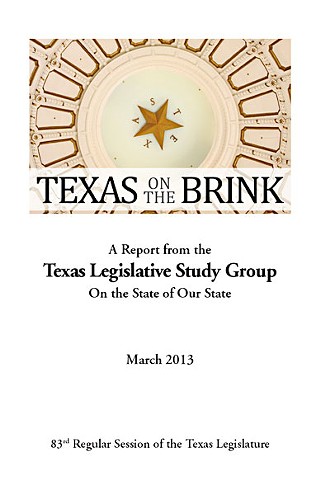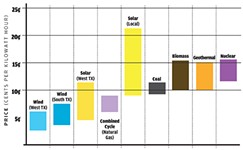Point Austin: Texas Brinkmanship
State report card shows plenty of room for improvement
By Michael King, Fri., April 19, 2013
Browsing through the latest edition of "Texas on the Brink" does not exactly evoke pride in what politicians and pundits like to call the "Texas Miracle." The section on education reports that among the 50 states and the District of Columbia, Texas is second in public school enrollment – and 50th in the percentage of the population that has graduated from high school. In the percentage of people uninsured, we're No. 1 with a bullet; we had been hovering around 26%, and now we've hit 28.8% of the population, easily the highest in the nation. On the environmental front, we're No. 1 in the amount of carbon dioxide emissions (but a paltry fourth in the amount of toxic releases into water, and in carcinogens released into the air).
And there's always capital punishment: We remain No. 1 in executions, a ranking not likely to be challenged anytime soon. (In fairness, Virginia at times approaches Texas in per capita rates; the two states account for more than half of all U.S. executions since 1976, with no noticeable effect on public safety.)
"Texas on the Brink" is a report produced by the staff of the Legislative Study Group, a House caucus currently chaired by Rep. Garnet Coleman, D-Houston. The March 2013 edition is the sixth; El Paso Sen. Eliot Shapleigh (since retired) published the first one in 2003, and the LSG has followed in the last couple of cycles. A predecessor report, "Texas: Where We Stand," was formerly compiled by the Comptroller's Office, covering many more categories, and in theory an occasion for Texas boosterism: biggest oil and gas production, largest number of new jobs, whopping beef production, that sort of thing. But reporters (and readers) kept getting distracted by those other numbers: highest uninsured, highest teenage birth rate, largest prison population, most toxins released, etc., and of course, all those executions. (At the moment, we're only fourth in the rate of incarceration, so there's that.) The comptroller (then Carole Keeton Strayhorn) quietly abandoned the project; the recent versions are less comprehensive, but range from tax statistics to "Democracy," where we learn our state is wallowing at 47th in the percentage of the voting-age population registered to vote, and dead last – 51st – in the percentage that actually votes.
Unhealthy Numbers
Coleman and other LSG members released the report Monday, with a brief press conference calling attention to some of the most striking numbers. Rep. Armando Walle, D-Houston, noted that the state ranks second in the highest percentage of uninsured children, and that nearly one in three Texas children lives in poverty. Corpus Christi Rep. Abel Herrero and El Paso Rep. Mary Gonzalez considered the numbers for public schools (44th in high school graduation rate) and higher education (41st in the percentage of high school graduates entering college).
Fort Worth Rep. Lon Burnam surveyed the environmental rankings, where Texas is perennially at or near the top of self-generated environmental hazards, and he noted some important connections. "Texas gets an 'F' in environmental protection, and it gets an 'F' in health care – not just because of lack of health insurance, but because we've allowed the creation of an environment that is unhealthy for our children and elderly." Burnam pointed out that even when the federal government mandates environmental improvements, "We have an attorney general that sues the EPA over every single initiative that tries to make us healthy."
Praying for Rain
And so on. Yet Coleman said the report "is designed not to shame Texas, but to inspire us to be better." And he ended on a tentatively optimistic note, noting that if the GOP majority is to accomplish two major economic initiatives – improvements to water and transportation infrastructure – it will need the Rainy Day Fund. It takes at least 100 House votes to access that money – just as it would for the two progressive priorities: public education and health care (i.e., Medicaid expansion). To get to that magic number, noted Coleman, "We're all going to have to work together."
Later, I asked him if there were substantive reasons to believe that such an outcome is really possible. He was cautious, and said nothing would be settled until the final days of the session and the budget votes, but that nearly every legislator seemed to realize that some bipartisanship would be necessary. "There aren't 100 Republican House members, and they're not all united on their priorities. I haven't heard anyone, Republican or Democratic, say they don't think we need water infrastructure and surface transportation improvements, but there are also plenty of Republicans for whom public education is also a priority. And to tap that Rainy Day Fund, you need 100 votes." On Medicaid, he noted, money isn't the real issue, since 90% of that expanded funding would be federal – funding the state desperately needs.
Speaking of the $5.4 billion that was cut from public education in the last session, Coleman said simply, "Excellence comes from appropriate funding. We can't be competitive if we don't have an educated workforce. Texas demographics are changing, so we need to educate people of all hues." With the session entering its stretch run, he suggested, it's at least possible that a bipartisan consensus can be reached on the big budget issues. "We're moving our way towards agreement," he said. "We know we're not that far apart, but the fact that 100 votes are required changes the dynamic."
"We're trying," he said, "to get to yes."
Read the entire "Texas on the Brink" report (PDF format). Follow @PointAustin on Twitter.
Got something to say on the subject? Send a letter to the editor.











